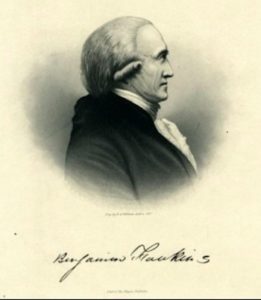
Benjamin Hawkins
*Benjamin Hawkins was born on this date in 1754. He was a white-American planter, slave owner, statesman, and U.S. Indian agent. Hawkins was born to Philemon Hawkins and Delia (Martin) Hawkins on August 15, 1754, the third of four sons. The family farmed and operated a plantation in Granville County, North Carolina.
He attended the county schools, then at the College of New Jersey (later to become Princeton University). He spoke many languages", a linguistic competence that would later enable him to learn Indian languages. When the College (which he never completed) closed because of the approach of British troops, Hawkins was a Colonel and served for several years on George Washington's staff as his main interpreter of French. Hawkins was released from federal service late in 1777, returning home, where he was elected to the North Carolina House of Representatives in 1778. He served there until 1779 and again in 1784.
The North Carolina General Assembly sent him to the Continental Congress as their delegate from 1781 to 1783 and again in 1787. In 1789, Hawkins was a delegate to the Fayetteville Convention that ratified the United States Constitution. He was the first U.S. senator, serving from 1789 to 1795. However, the Senate did not have organized political parties then; Hawkins' views aligned with different groups. Appointed by George Washington in 1796 as one of three commissioners to the Creeks, in 1801, President Jefferson named him "principal-agent for Indian affairs south of the Ohio [River]" and was the principal Indian agent to the Creek Indians.
Hawkins established the Creek Agency and his plantation near present-day Roberta, Georgia, in what became Crawford County. He learned the Muscogee language and had a Creek woman, Lavinia Downs, as a common-law wife, who provided an entry into that world in the Creek's matrilineal society. He had seven children with her, although he resisted Creek's pressure to marry her until near the end of his life. He wrote extensively about the Creek and other Southeast tribes: the Choctaw, Cherokee, and Chickasaw. He eventually built a large complex using African slave labor, including mills and raised many cattle and hogs.
Hawkins' plantation used enslaved labor. He transformed the Creek Agency and Fort Hawkins into holding stations for fugitive slaves and paid Indians $50 (equivalent to $864 in 2020) for every fugitive delivered there. (He expected to be reimbursed by their owners.) He captured blacks that did not have an owner, told the Creeks to keep them, and encouraged slavery among the Creeks. Hawkins first used the term negro fort to refer to Fort Gadsden, the British Post on the Apalachicola River, in Spanish Florida. Hawkins started the call for its capture or destruction.
In 1812, thinking he was on his deathbed, Hawkins remarried his wife, Susan Lavinia Downs, to ensure their children were legitimate in U.S. society. Jeffersonia was born after this marriage. Hawkins was close to his nephew William Hawkins, who made a co-executor of his estate and his wife; he bequeathed to William a share of his estate, which was quite large. This legacy became a significant source of contention among his heirs, as he had not altered his will to include his youngest daughter, Jeffersonia.
Benjamin Hawkins died on June 6, 1816. The Georgia Historical Society has three boxes of Hawkins material, some of which have been published.